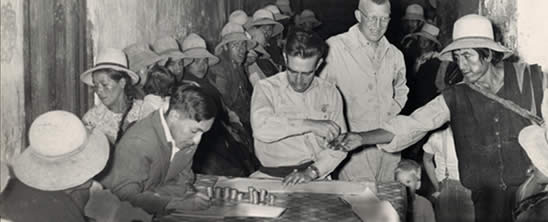|
|
In This Section:See Also:
|

Cornell - Peru ProjectA Brief History of the Cornell-Peru Project
As was common for that period, Holmberg and the other North American researchers did not speak Quechua but one of the graduate students eventually gained fluency. However, Mario Vázquez, a Peruvian university student and native Quechua speaker from Chiquian, Ancash, who earned his Ph.D. from Cornell, became the co-director of the Vicos Project. Enrique Luna, the former administrator of the hacienda, was hired by the project along with a staff of seven Peruvians, two of whom were Vicosinos. During the fourteen years of the project, over thirty Peruvian researchers worked in Vicos and according to one of the original researchers, perhaps as many as 500 foreigners visited or conducted studies in Vicos. In 1965 when Peace Corps volunteers met with opposition from the community, they were expelled. However, the Peace Corps has returned and a volunteer is working with the current ecotourism project. Peruvian governmental agencies however stayed involved in Vicos until 19741 (Mangin 1979) The Vicos hacienda, a failing economic enterprise, comprised 43,750 acres but less than 10% was cultivated with the
patrones controlling the best lands near the river (Stein 2003:185). Moreover since 1953, when the hacienda
ironically became a property of a public beneficial society, it had been passed from renter to renter with little
attention to
improving the living conditions of the indigenous population or sustaining the environment. One of the first studies
that the Cornell-Peru Project and the ministry of Health completed found that Vicosinos were suffering from endemic
starvation and were debilitated by numerous gastro-intestinal and respiratory diseases (Doughty 2004). Potato production
in 1952 was almost extinct due to diseases and pests when the Cornell-Vicos experiment was initiated. The indigenous
population attached to the land at that time consisted of 2,250 Vicosinos who were obligated to the patrones of
the hacienda through labor and service for which they received usufruct rights of small plots of hacienda land. These
serfs were listed along with plants and animals of the hacienda in lease agreements. Male serfs were required to work
three days a week in the patron's fields; |